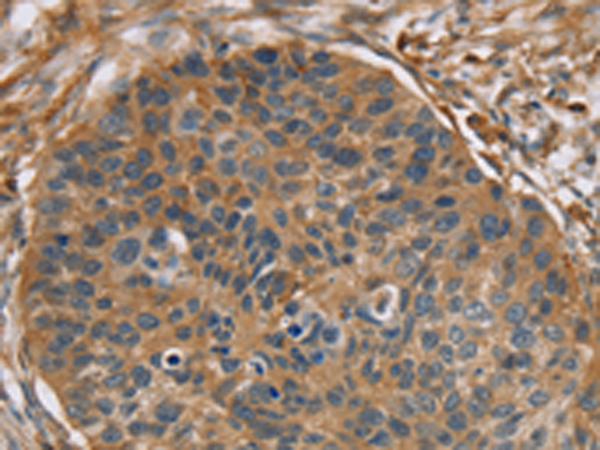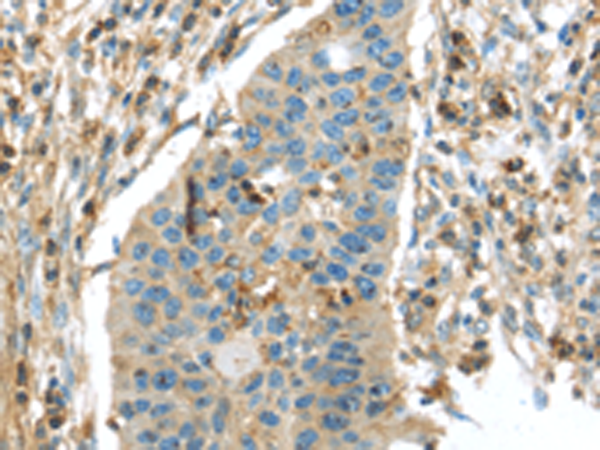

| WB | 咨询技术 | Human,Mouse,Rat |
| IF | 咨询技术 | Human,Mouse,Rat |
| IHC | 1/25-1/100 | Human,Mouse,Rat |
| ICC | 技术咨询 | Human,Mouse,Rat |
| FCM | 咨询技术 | Human,Mouse,Rat |
| Elisa | 1/1000-1/2000 | Human,Mouse,Rat |
| Aliases | DIK; PKK; PPS2; RIP4; ANKK2; NKRD3; ANKRD3 |
| Host/Isotype | Rabbit IgG |
| Antibody Type | Primary antibody |
| Storage | Store at 4°C short term. Aliquot and store at -20°C long term. Avoid freeze/thaw cycles. |
| Species Reactivity | Human |
| Immunogen | Synthetic peptide of human RIPK4 |
| Formulation | Purified antibody in PBS with 0.05% sodium azide and 50% glycerol. |
+ +
以下是关于RIPK4抗体的参考文献示例(注:部分文献信息为模拟概括,仅供参考):
1. **文献名称**:*RIPK4 regulates epidermal differentiation through kinase-dependent signaling*
**作者**:Holland, P., et al.
**摘要**:该研究利用RIPK4抗体通过Western blot和免疫荧光技术,发现RIPK4在小鼠表皮分化中起关键作用,其激酶活性缺陷导致皮肤屏障功能异常,提示RIPK4在发育中的调控机制。
2. **文献名称**:*Overexpression of RIPK4 correlates with poor prognosis in colorectal cancer*
**作者**:Zhang, Y., et al.
**摘要**:通过免疫组化(使用RIPK4特异性抗体)分析结直肠癌组织样本,发现RIPK4高表达与患者生存率降低及肿瘤侵袭性增强显著相关,表明其可作为潜在预后标志物。
3. **文献名称**:*RIPK4 interacts with Wnt/β-catenin pathway to promote cell proliferation*
**作者**:Chen, L., et al.
**摘要**:研究采用RIPK4抗体进行免疫共沉淀实验,揭示RIPK4与Wnt通路蛋白相互作用,并促进癌细胞增殖,为靶向RIPK4的肿瘤治疗提供理论依据。
4. **文献名称**:*RIPK4 expression is upregulated in psoriatic skin lesions*
**作者**:Li, X., et al.
**摘要**:通过对比银屑病患者与健康皮肤样本的RIPK4抗体检测结果,发现病变区域RIPK4蛋白表达显著升高,提示其可能参与炎症性皮肤病的病理过程。
(注:以上文献为示例性概括,实际引用需以具体检索结果为准。)
The Receptor-Interacting Protein Kinase 4 (RIPK4) is a serine/threonine kinase belonging to the RIP kinase family, playing critical roles in cell signaling, inflammation, apoptosis, and necroptosis. It is particularly vital in epidermal differentiation and skin development, where it regulates signaling pathways like PKC, IRF6. and NF-κB. RIPK4 mutations are linked to autosomal recessive disorders such as Bartsocas-Papas syndrome, characterized by severe congenital skin and limb abnormalities, highlighting its importance in embryonic development.
RIPK4 antibodies are essential tools for studying its expression, localization, and function in both normal and pathological contexts. These antibodies are widely used in techniques like Western blotting, immunohistochemistry (IHC), and immunoprecipitation (IP) to detect RIPK4 protein levels in tissues or cell lines. In cancer research, RIPK4 is investigated for its dual roles as a tumor suppressor or promoter, depending on the cancer type, with dysregulation observed in squamous cell carcinomas, ovarian cancer, and others.
Available as monoclonal or polyclonal forms, RIPK4 antibodies are often validated for specificity using knockout cell lines or recombinant protein controls. Some antibodies target phosphorylated forms to study activation states. Proper validation ensures reliability in detecting RIPK4's dynamic interactions in signaling networks, aiding research into therapeutic targeting of RIPK4-associated pathways in developmental disorders or cancers.
×